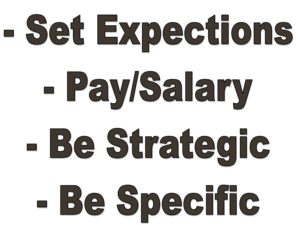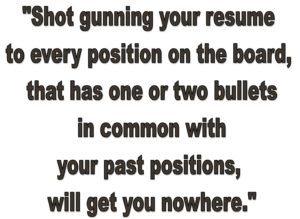4 Things to Know When Changing Careers

by Gregg Podolski, Direct Hire Manager
I’ve had a lot of candidates lately tell me that they’re looking to change careers and asked for my advice on how to do so. Okay, here are 4 things to keep in mind:
1. Set your expectations accordingly
One of the biggest frustrations I hear from people looking to change careers stems from their belief that they are perfectly capable of performing the functions of whatever role they are applying for, if only someone would give them a chance. This is often times very true but, unless you have a connection at the company who can vouch for your abilities, the simple fact is that the majority of candidates you’re going up against will have more experience in that role than you do. And from a company’s perspective, hiring someone with more direct experience in the role is just a safer bet. So however long you expected your job search to take, be prepare to have it stretch out just a little bit longer.

2. Being willing to take a pay cut is a double-edged sword
On the one hand, it’s almost impossible to change careers without taking a step back in pay. This is especially true the higher up the ladder you are. Someone with only a few years working experience may be able to make a lateral move, but it’s exceedingly rare for a company to hire someone at the supervisory level or above with little to no experience in the field. Most of the candidates I speak with understand this and are prepared to take that financial hit in order to get their foot in the door.
The flip side, unfortunately, is that many companies are skeptical about such motivations. In their eyes, their position will merely be a place-holder until something comes along that is more in line with where the candidate really wants to be, especially if that candidate is unemployed at the time. In other words, the candidate is selling themselves as a bargain, while the company only sees a flight risk.

3. Be strategic
Aside from having a connection at the company as mentioned above, this is the most effective way to make a career switch. Know exactly what type of industry you want to break into and then figure out what role best suits your financial needs, as well as have enough in common with your existing skills to make a hiring manager consider bringing you in. Shot gunning your resume to every position on the board that has one or two bullets in common with your past positions will get you nowhere.
4. Be specific
When changing careers, it’s not enough to simply apply to an opening and then sit back and wait (remember, your competition already has a significant advantage on experience alone). Before you apply to any position, research the company. Find something about them that sparks your interest. Dig into the details of the role you want and pull out any piece of it that gets you excited, then, in your cover letter/email, talk about those things specifically.
If possible, find the hiring manager on LinkedIn and directly message them about why you are so interested in this role in particular. Do this for every single position you apply to. The more passion you show for the role and the company, the more likely they will be to overlook their concerns about salary or experience long enough to at least have a phone conversation. And THAT’S when you have a chance to wow them with everything you bring to the table, even if it all doesn’t match neatly with their job specs.
 Though it’s not as easy as moving around within your own industry, changing careers is certainly not impossible. I have placed many candidates over the years in positions that were very different from what they’ve done before. Sometimes, a fresh set of eyes is exactly what a company is looking for, but it’s up to you to show them why you’re worth the gamble.
Though it’s not as easy as moving around within your own industry, changing careers is certainly not impossible. I have placed many candidates over the years in positions that were very different from what they’ve done before. Sometimes, a fresh set of eyes is exactly what a company is looking for, but it’s up to you to show them why you’re worth the gamble.
Gregg Podolski, is Emerson Group’s Direct Hire Manager. Gregg works on positions in all industries including C-Level Suite, Sales, Account Management, IT and Manufacturing/Operations/Project Managers.
#ProfessionalSearch #EmersonJobs #Careers